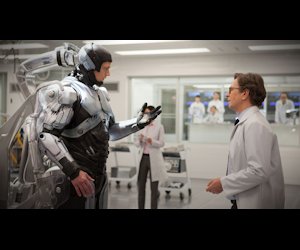Movie Review: Robocop (2014)
 | | Robocop |
Remakes are a tricky business. Fans of the original will automatically be on the defensive, passing judgment on changes before the opening credits even roll, and are nearly impossible to please. Meanwhile, people who don't like the original will be skeptical about seeing another version of it. 2014's Robocop is a perfect example of this phenomenon, and its poor box office performance (in the States at least; it's making a killing overseas) should hardly be surprising, given the disastrous performance of other recent remakes of sci-fi "classics" like Total Recall. Still, I made a concerted effort not to let prejudice taint my opinion of the movie before seeing it, and I was able to be cautiously optimistic by the time I went into the theater. The question, then, is whether this retelling of the cyborg lawman origin story can overcome everyone else's preconceived opinions about it.
The 1987 original is more satire than sci-fi, with a hard "R" rating that reflects plenty of over-the-top violence and a ridiculously high body count. The remake, with its "PG-13" rating, clearly isn't following the same playbook. Instead, it opts for more sci-fi than satire, toning down the violence and body count to more family-friendly numbers (though I rush to point out that this is still not a kid-friendly movie) while spending more time explaining the finer details of how Robocop's technology works and what it means philosophically.
Where the remake is at its worst, it is trying to inject the satire of the original. Throughout the movie, there are interruptions from a hyperbolic political opinion show called "The Novak Element" (featuring Samuel Jackson, who spends every second in front of the camera with his ham dial set to 11). These scenes try to be reminiscent of the satirical commercials from the original film, but they come across as wildly out of place--even annoying--and they throw in the audience's face obvious political themes that would have been more effective as subtext.
 | | Sorry, Sam, but you don't really fit in this movie |
This brings up the film's second primary weakness: its lack of thematic cohesiveness. The original was crystal clear in its satire of commercialism and gluttony, but the remake can't decide what point it's really trying to make. On one hand, you have the timely contemplation of putting drones on American streets, something that has actually been discussed with full seriousness in the United States Congress in the real world. On the other hand, the story also tells a much more ponderous story about the nature of free will, medical ethics, and the potentially dehumanizing effects of technology. The remake never takes a single idea and runs with it the way the original does. While this makes for a more well-rounded story, it is ultimately not as provocative.
Fortunately, the movie more than makes up for this. The plot, while not as focused, is certainly more thought-out and effective. When the movie takes itself seriously, it's much easier to relate to this version of Alex Murphy. No offense to the great Peter Weller, but his Murphy is far more one-dimensional and his Robocop is practically a different character. Joel Kinnaman may not be as good an actor as Weller, but he's far more believable as an idealistic Detroit cop just trying to do his job, and his version of Robocop is far more connected to the character he was before his transformation. As in the original, Murphy is nearly killed as he closes in on a hotbed of corruption within the Detroit police department, and when he becomes Robocop, his desire for justice-slash-vengeance threatens to override his robotic programming.
This Robocop is more about taking a whole person and slowly stripping away the things that make him human. It asks explicit questions about where the man ends and where the machine begins, even poking dangerously close to the conclusion that man is just a machine to begin with. These heady philosophical questions are handled exceptionally well by the character of Dr. Dennett Norton (Gary Oldman), Robocop's chief creator. Norton is introduced as a doctor working with wounded soldiers who have had limbs replaced by state-of-the-art prosthetics. In his opening scene, he is convincing a skeptical musician that he can still play music using mechanical fingers. He is initially abhorred by the idea of creating Robocop, but when he is presented with the case of Alex Murphy, a man who will undoubtedly die without the kind of radical intervention being proposed, he accepts his job, blinded by the potential advancements in technology and research it will grant.
 | | Gary Oldman, on the other hand, is incredible |
There is a scene, after Murphy wakes up as Robocop, in which Dr. Norton reveals the extent of the man's injuries. This horrifyingly surreal moment--I won't spoil it for you, but sufficed to say, have an empty stomach if you're queasy--so upsets Murphy that he begs to be put out of his misery. Dr. Norton talks him down from his suicidal impulse, but the scene is extremely powerful and shows how much more psychologically intense this iteration of Robocop is going to be.
Worry not, though, because it does not eschew the sci-fi action that fans should expect from a movie called Robocop. While this Robocop does most of his arrests using a high-tech taser device, he is still capable of the ludicrous violence we see in the original flick. There are a few scenes in which Robocop doesn't bother with the taser, going with far more lethal weaponry, and the body count, while probably not as high as in 1987, is still pretty damn high. The movie does have a few shaky-cam action scenes (which are annoying, but not Greengrass-level), but there are also plenty of scenes where the camera pulls back and pans around for more epic set-piece moments. One could look at it as the shaky-cam sections being scenes in which Murphy is more human, whereas the controlled sweeps and zooms are scenes in which Murphy is more of a robot. As the movie progresses, the action scenes get better and better, leading to one of the best climaxes in recent memory.
But where the original uses its action and violence to comment on how desensitized modern man has become to such excess, this movie shows how far you have to chip away at a person's soul in order to make him a ruthless killing machine. Dr. Norton has to make all kinds of changes to Murphy's brain chemistry--even going so far as to lobotomize him at one point--to make Robocop possible, and that's a lot more disturbing, especially considering the fact that most of the characters in this version are far more grounded and multi-dimensional. When Dr. Norton is conducting his lobotomy, it's hard not to think about Murphy's young son, who is in extreme emotional distress because a part of his childhood is being carved out, and it's hard not to think of Dr. Norton, who is actively removing his own conscience in order to do what he's doing.
 | | He's still a badass |
Also worth mentioning are the admirable performances by the likes of Michael Keaton, Michael K. Williams, and Abbie Cornish. Keaton walks a thin line between being comic relief and the near-sociopathic CEO of Omnicorp who gets the idea for Robocop as a way around a legal obstacle, and he steals practically every scene he's in. Michael Williams (better known as Omar Little, for fans of The Wire) plays Murphy's partner, Lewis, and does an amazing job as the guy who fully understands what is happening to his friend but is powerless to do anything about it. Abbie Cornish plays Murphy's wife, Clara, and has the unenviable task of playing a woman who spends the entire film in a state of suspended grief over the loss of her husband and the psychological collapse of her young son. Though she is mostly crying her way through the story, her performance is heart-wrenching and poignant.
The final analysis, then, is that this is a much more serious and intense movie than 1987's schlock classic, and a much more successful remake than the abyssmal Total Recall. What director José Padilha lacks in mimicking Paul Veerhoven's joyfully indulgent style he more than makes up for with a care and consideration for the more cerebral and horrifying realities beneath the fantasy. Padilha's biggest mistake was in trying to honor the original's campiness through "The Novak Element," but when he allows himself to zoom in on what's going on beneath Robocop's armor, to deal with all the uncomfortable ramifications of an everyman having his humanity chipped away from him, he proves to be up to the task. This is an exceptionally good sci-fi action film with one or two glaring problems, and fans should be able to enjoy it, as long as they know what they're getting into.
FINAL SCORE:





Though a little uneven and thematically muddled, 2014's Robocop is a much more psychologically intense film than its predecessor, helped along by strong acting and an intelligently conceived script.
|
-e. magill 2/28/2014
|
|